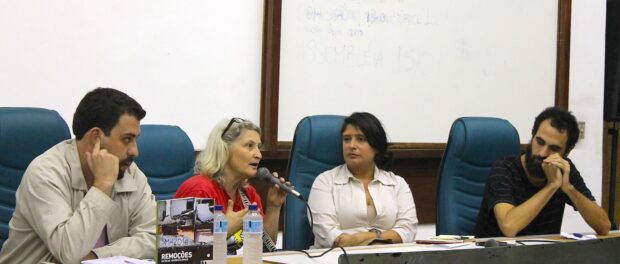
On Wednesday May 13 the Rio de Janeiro State University (UERJ) hosted a panel featuring Lucas Faulhaber (right, in the photo above), Maria de Lourdes Lopes (center left), and Guilherme Boulos (left) to discuss the issues of forced evictions and urban reform in the Olympic city.
Lucas Faulhaber, alongside Lena Azevedo, is one of the authors of the book released on the day of the panel entitled SMH 2016: Removals in Olympic Rio de Janeiro. Maria de Lourdes is an activist and active member of the National Movement of Housing Vindication (Movimento Nacional de Luta pela Moradia – MNLM) and Guilherme Boulos is a critic and active member of the Movement of Homeless Workers (Movimento dos Trabalhadores Sem Teto – MTST).
Prior to the beginning of the panel, the moderator acknowledged the protests that were happening outside and explained they were against the state government’s treatment of the university, as many workers have gone as long as six months without pay. The moderator said she would not apologize for the protests because what the government is doing, both to the university and to victims of forced evictions, is unacceptable in terms of human rights.
 Faulhaber was the first to speak, saying the purpose of the book was to “show and report the process that is happening due to mega-events like the World Cup and the Olympic Games. This process isn’t only because of the World Cup or the Olympic Games; this is a recurring process in the history of of Rio.” Faulhaber also discussed his disappointment with the media, pointing out how the question of forced evictions is barely gaining visibility and criticizing the mainstream Brazilian media for only showing up [in favelas] when there are deaths involved, rather than when other problems arise. It angers him that “every day in O Globo they are demanding that more people should be evicted.”
Faulhaber was the first to speak, saying the purpose of the book was to “show and report the process that is happening due to mega-events like the World Cup and the Olympic Games. This process isn’t only because of the World Cup or the Olympic Games; this is a recurring process in the history of of Rio.” Faulhaber also discussed his disappointment with the media, pointing out how the question of forced evictions is barely gaining visibility and criticizing the mainstream Brazilian media for only showing up [in favelas] when there are deaths involved, rather than when other problems arise. It angers him that “every day in O Globo they are demanding that more people should be evicted.”
De Lourdes Lopes spoke passionately, saying she’s happy with the research Faulhaber did but that it is not enough. She said: “The impact people have felt [from research such as this] is almost nothing. Things are getting worse. For example, in Vila Autodromo, where there are fewer and fewer people fighting for their homes… Our screams aren’t being heard.”
The final panelist Boulos followed her. In his view, “we are living an urban crisis. We are taught to think that economic growth is good, and in the capitalist sense it is. But it also has anti-popular collateral effects… The increased value of land and rents have led to gentrification, to segregation, which expels the poor people of that region to new peripheries.”
He went on to discuss how real estate speculation and the police have helped create a policy of exclusion. He said: “Real estate speculation has a military component, which excludes the poor from certain regions. Real estate speculation has exploited the Pacifying Police Units (UPPs). From an outsider’s perspective and our own, this has become a policy of extermination of young black lives in the peripheries and in the favelas of our city.”
Boulos proposed various solutions to the problems posed by forced evictions and gentrification, such as a government monitored housing market similar to those of the United States and Europe. He also proposed a policy of social allocation in which the federal housing program Minha Casa Minha Vida (MCMV) would subsidize families to stay close to their original homes instead of pushing them to the peripheries. In his opinion, sending families to the peripheries is a poor investment choice that stunts the growth of communities.
After the panelists finished speaking, the floor opened up to the audience for questions and testimonies. One young woman named Mariana shared the story of how she was threatened out of a home, as had occurred to the other evictees she knows. As more and more people rose in front of the panel and shared their personal experiences, it became clear just how traumatizing this topic is for the many affected. Maria de Lourdes Lopes summarized these statements: “I don’t want another house, I want my house.”

